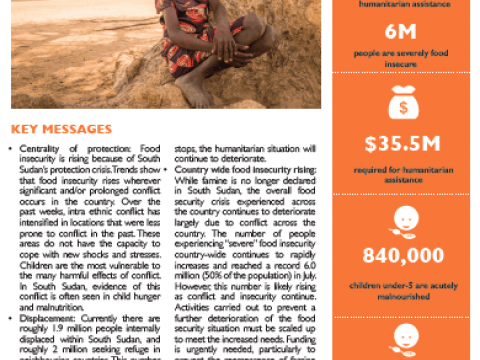World Vision South Sudan - Situation Report 9
Download
World Vision's response team in South Sudan reached more than 500,000 people with food assistance during the last three weeks.
Our response continues. We continue to highlight:
- Food insecurity is rising because of South Sudan’s protection crisis. Trends show that food insecurity rises wherever significant and/or prolonged conflict occurs in the country. Over the past weeks, intra ethnic conflict has intensified in locations that were less prone to conflict in the past. These areas do not have the capacity to cope with new shocks and stresses. Children are the most vulnerable to the many harmful effects of conflict. In South Sudan, evidence of this conflict is often seen in child hunger and malnutrition.
- Displacement: Currently there are roughly 1.9 million people internally displaced within South Sudan, and roughly 2 million seeking refuge in neighbouring countries. This number is likely to rise if conflict in the eastern part of the Greater Upper Nile region continues to push civilians into Ethiopia. World Vision asks all stakeholders to work together more than ever before to facilitate peace and security throughout the country and to allow urgent and unimpeded access to humanitarian and development actors in the country. While humanitarians will continue to do all that is possible to alleviate suffering and save lives, until fighting stops, the humanitarian situation will continue to deteriorate.
- While famine is no longer declared in South Sudan, the overall food security crisis experienced across the country continues to deteriorate largely due to conflict across the country. The number of people experiencing “severe” food insecurity country-wide continues to rapidly increases and reached a record 6.0 million (50% of the population) in July. However, this number is likely rising as conflict and insecurity continue.
- Activities carried out to prevent a further deterioration of the food security situation must be scaled up to meet the increased needs. Funding is urgently needed, particularly to prevent the reemergence of the previous famine and address areas at risk of a famine. The speed at which this is done is paramount considering operations during the rainy season are significantly more costly and challenging.
More information on World Vision's response and the numbers of people reached available by downloading the latest Situation Report.